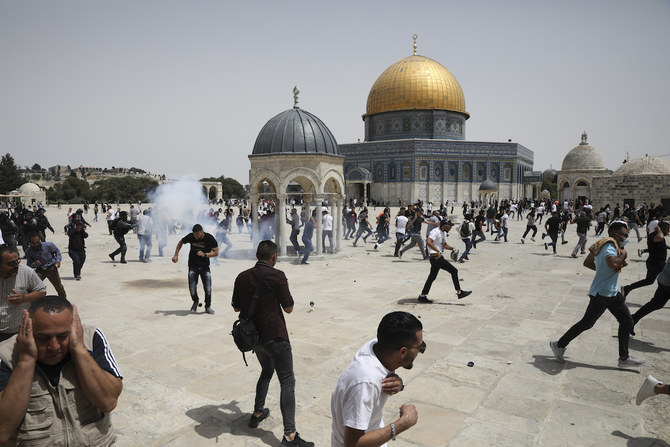GAZA CITY: A truce between Israel and Hamas took hold on Friday after the worst violence in years, but brief clashes broke out around Al-Aqsa Mosque in Jerusalem where similar scenes had touched off the Gaza conflict.
Israel's bombardment of Gaza and militant rocket attacks on Israeli towns ceased after 11 days under an agreement mediated by Egypt, which is negotiating with both sides on ways to maintain stability.
The Gaza violence was set off in part by Israeli police raids of East Jerusalem's Al-Aqsa Mosque compound and clashes with Palestinians during the Muslim holy month of Ramadan. Thousands had gathered there for Friday prayers, with many staying on to demonstrate in support of Gaza.
Israeli police fired stun grenades towards Palestinians, who threw rocks and petrol bombs at officers, a Reuters witness said, and Palestinian medics said some 20 Palestinians were wounded.
The confrontations died down within about an hour, with Israeli police retreating to positions at the compound's gates.
In Gaza, five more bodies were pulled from the rubble in the densely populated Palestinian enclave, taking the death toll to 243, including 66 children, with more than 1,900 wounded.
The Israeli military said a soldier had been killed as well as 12 civilians; hundreds have been treated for injuries after rocket salvoes that caused panic and sent people rushing into shelters as far away as Tel Aviv.
Palestinians who had huddled in fear of Israeli shelling poured into Gaza's streets, embracing one another in celebration in front of bombed-out buildings. Mosque loudspeakers feted "the victory of the resistance". Cars drove around flying Palestinian flags and honking horns.
In the countdown to the 2 a.m. (2300 GMT Thursday) cease-fire, Palestinian rocket salvoes continued and Israel carried out at least one air strike.
Egypt said it would send two delegations to monitor the truce as the warring parties said they were ready to retaliate for any violations.
Civilians on both sides of the front line were sceptical.
"I don't agree to (a truce). What is truce? What does it mean?" said Samira Abdallah Naseer, a mother of 11 children sitting near the wreckage of a building near Beit Hanoun in the north of the Gaza Strip.
"We returned to our houses, and we found no place to sit, no water, no electricity, no mattresses, nothing," she said.
In a cafe in the Israeli port city of Ashdod, north of Gaza, student Dan Kiri, 25, said Israel should continue targeting Hamas until it collapsed.
"The fact that we are sitting here, peacefully drinking coffee and eating our croissant, it's only a matter of time until the next operation in Gaza," he said.
The violence erupted on May 10, triggered by Palestinians' anger at what they saw as Israeli curbs on their rights in Jerusalem, including during police confrontations with protesters at Al-Aqsa mosque during the Ramadan fasting month.
Israeli Prime Minister Benjamin Netanyahu said the operation had hit the ability of Hamas, the Islamist group which runs Gaza, to launch missiles at Israel.
Netanyahu said the Israeli military had attacked and destroyed Hamas’s extensive tunnel network in Gaza, its rocket factories, weapons laboratories and storage facilities, and killed more than 200 militants, including 25 senior figures.
"Hamas can't hide anymore. That's a great achievement for Israel," he said in a televised address. "We eliminated an important part of Hamas's and Islamic Jihad's command echelon. And whoever was not killed, knows today that our long arm can reach him anywhere, above ground or underground."
Hamas however cast the fighting as successful resistance to a militarily and economically stronger foe.
"It is true the battle ends today but Netanyahu and the whole world should know that our hands are on the trigger and we will continue to grow the capabilities of this resistance," said Ezzat El-Reshiq, a senior member of the Hamas political bureau.
El-Reshiq told Reuters in Doha that the movement's demands included protecting Al-Aqsa and stopping Palestinians being evicted from their homes in East Jerusalem.
Saleh Diab, who was among those threatened with eviction, was relieved but wary. “This is a morning of freedom, a morning of victory," he said, adding that he hoped to remain in his home but feared what Israel would do next.
Amid growing global alarm, U.S. President Joe Biden had urged Netanyahu to seek de-escalation, while Egypt, Qatar and the United Nations sought to mediate.
The truce appeared to be part of a two-stage deal with Cairo sending security delegations to Tel Aviv and the Palestinian territories to agree on measures to maintain stability.
After days of Israeli air strikes, Gaza officials said 16,800 homes were damaged and residents were getting three or four hours of power compared with 12 hours before the fighting.
Palestinian officials put the cost of Gaza reconstruction in the tens of millions of dollars, while economists said the fighting could curb Israel's economic recovery from the COVID-19 pandemic.
Biden said on Thursday aid would be sent quickly to Gaza. It would be coordinated with the Palestinian Authority - run by Hamas' rival, President Mahmoud Abbas, backed by the West and based in the Israeli-occupied West Bank - "in a manner that does not permit Hamas to simply restock its military arsenal".
Hamas is deemed a terrorist group in the West and by Israel, which it refuses to recognise.

























